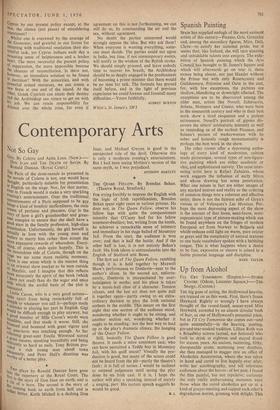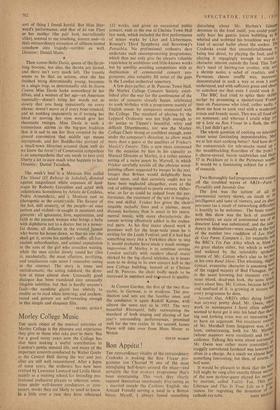Up from Alcohol
I'LL CRY TOMORROW. (Empire.)--STORM CENTRE. (Odeon:Leicester Square.)—THE SHAWL. (Curzon.) THE big guns of acting, the Hollywood heavies, are trained on us this week. First, there's Susan Hayward. Rightly or wrongly I have always thought of the round-faced, saucer-eyed Miss Hayward, aureoled by an almost circular bush of hair, as one of Hollywood's perennial jokes, but in I'll Cry Tomorrow she comes out—and quite successfully—in the heaving, panting, gin-and-tear-soaked tradition. Lillian Roth was a Broadway actress (actual, not fictional) who took to drink at eighteen and stayed drunk for sixteen years. An ancient, twittering, filthy, disreputable crone, muttering over dustbins, she then managed to stagger into an office of Alcoholics Anonymous, where she was taken in hand and cured to live happily ever after, write her autobiography, and tell television audiences about the horror; of her past. I found the film painful, but not repulsive; curiously the only really embarrassing moments were those when the cured alcoholics got up at a kind of prayer-meeting and capped each other's degradation stories, grinning with delight. This
sort of thing I found horrid. But Miss Hay- ward's performance, and that of Jo van Fleet as her mother (the pair look marvellously alike), seemed to me touching, sincere and—in their extraordinary evocation of silliness turned somehow into tragedy—terrible as well. Director: Daniel Mann.
it
Then comes Bette Davis, queen of the throb- bing bosoms; but alas, the throbs are muted,
and, there isn't very much left. The trouble seems to be that an actress, once she has finished being determinedly young, becomes, in a single leap, as determinedly old. In Storm Centre Miss Davis looks somewhere in her fifties, and a woman of her age—an American especially—doesn't bring her words out so slowly that you hang impatiently on every phrase; doesn't move as if every bone creaked, and sit nodding impassively as if turning her head or moving her eyes would give her rheumatic twinges. Miss Davis is such a tremendous actress in the big-gun tradition that it is sad to see her thus corseted by the absurd convention that middle age means decrepitude, and her Buddha-like portrait of a small-town librarian accused (how well do we know the form!) of Communist sympathies is so unsympathetic that one needs to love civil liberty a lot to care much what happens to her. Director: Daniel Taradash.
The week's best is a Mexican film called The Shawl (El Rebozo de Soledad), directed against magnificent white expanses of land- scape by Roberto Gavaldon and acted With unhistrionic homeliness by Arturo de Cordova, Pedro Armendariz, and a Mexican cast as photogenic as the countryside. The flavour of the hot, still country, of the people—at once patient and violent—is caught in moments and gestures: all ignorance, hive, superstition, and faith in the peasant woman who brings a baby with diphtheria not to a doctor but to a power- ful shrine; all defiance in the evicted farmer who burns his house down, so that no one else shall get it, across his mother's coffin; all fear, ancient subordination, and animal expectation in the eyes of the girl who crouches waiting, while the man circles slowly round her (this is, incidentally, the most effective, terrifying, and unsalacious rape scene I remember seeing in the cinema). The story is tense and melodramatic; the acting subdued, the direc- tion at times almost slow. Unusually good dialogue has been translated into unusually illegible subtitles, but that is hardly anyone's fault—the sunshine glares too whitely to enable us to read white lettering; and anyhow, mood and gesture are self-revealing enough in this simple and eloquent film.
ISABEL QUIGLY



































 Previous page
Previous page